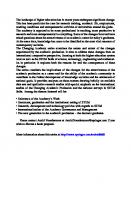Feminist Perspective in the Academy 0226468747, 9780226468747
A feminist perspective has made some difference to literary criticism. It is no longer possible for a serious scholar to
294 76 40MB
English Pages 162 [172] Year 1983
Recommend Papers

- Author / Uploaded
- Elizabeth Langland
- Walter Gove
File loading please wait...
Citation preview
I
•
The Difference t Makes
Edited by Elizabeth Lang and and Water Gove
A Feminist Perspective in the Academy
A FEMINIST PERSPECTIVE IN THE ACADEMY: The Difference It Makes
Edited by ELIZABETH LANGLAND WALTER GOVE
The University of Chicago Press Chicago and London
The essays in this volume originally appeared in the Winter 1981 issue of Soundings: An Interdisciplinary journal (volume 64, number 4) and are reprinted by arrangement.
The University of Chicago Press, Chicago 60637 The University of Chicago Press, Ltd., London
© 1981 by The Society for Values in Higher Education and Vanderbilt University All rightS reserved. Published 198 I University of Chicago Press edition J 983 Printed in the United States of America
908988878685M83
12345
Library of Congress Cataloging in Publication Data
Main entry under title: A Fenunist perspective in the academy. Originally issued as a special issue of Soundings, v. 64, no. 4, winter 198 J. Contents: The difference it makes / Patricia Meyer Spacks - New directions for feminist criticism in theatre and the related arts / Nancy S. Reinhardt - The feminist critique in religious studies / Rosemar y Radford Ruether - [etc.] 1. Women's studies - United States. 2. Women college teachers - United States. I. Langland, Elizabeth. II. Gove, Walter R. III. Soundings (New Haven, Conn.) HQI 181.U5F45 1983 305.4'07'1173 82-17520 ISBN 0-226-46874-7 (hard) ISBN 0-226-46875-5 (pbk.)
Contents ELIZABETH LANGLAND
and
WALTER GOVE
1
Editors' Notes
PATRICIA MEYER SPACKS
7
The Difference It Makes
NANCY S. REINHARDT
25
New Directions for Feminist Criticism in Theatre and the Related Arts
ROSEMARY RADFORD
52
The Feminist Critique in Religious Studies
CARL N. DEGLER
67
What the Women's Movement Has Done to American History
NANNERL 0 . KEOHANE
86
Speaking From Silence : Women and the Science of Politics
NANCY S . BARRETT
101
How the Study of Women Has Restructured the Discipline of Economics
JUDITH SHAPIRO
110 Anthropology and the Study
RUETHER
of Gender JANET T . SPENCE
130 Changing Conceptions of Men and Women : A Psychologist's Perspective
CYNTIUA F1JCHS EPSTEIN
149 Women in Sociological Analysis: New Scholars hip Versus Old Paradigms
ACKNOWLEDGMENTS The editors thank The Ethel Mae Wilson Fund of the Graduate School of Vanderbilt University, and the Fund's administrator Dean Ernest Q. Campbell, for sponsoring and funding the lecture series which gave rise to A Feminist Perspective in the Academy. The Ethel Mae Wilson Fund also assisted in defraying the cost of publication in Soundings. Gratitude is likewise expressed to The Women's Studies Committee of the College of Arts and Science at Vanderbilt University for its support of the lecture series.
EDITORS' NOTES
The advent of ,vomen's studies has brQught a feminist perspective into the academy-but has it made a difference there? That \.vas the question we posed to the nine distinguished scholars who lectured at Vanderbilt in 1980-8 1 and who subsequently revised their lectures for publication in this volume. Has the feminist perspective transformed our curriculum ; has it reshaped our materials; has it altered our knowledge? We found that feminist analyses have begun to alter scholarship, but women's studies has yet to have a substantial influence on the traditional curriculum, principaHy because such analyses challenge fundamental assumptions in each discipline. A feminist perspective has made some difference to literarr criticism, argues Patricia Meyer Spacks in "The Difference It Makes." In considering Jane Austen, for example, Spacks notes that it is no longer possible for a serious scholar to ignore the insights of feminist critics into Austen's novels. Yet while scholars must modify their papers in response to feminist insights, feminist scholarship appears as footnotes to articles in prestigious journals, and it rarely appears as an article in its o,vn right, as Spacks' informal survey of such journals indicates. Furthermore, scholars often do not bring feminist scholarship into the classroom. Spacks concludes that feminis t perspectives in literature are beginning to make thernselves felt , but they have yet to restructure study '"ithin the discipline. Rosemary Ruether, in her survey of religious studies, recognizes that the change there is also coming slowly. Ruether observes that ,vomen are entering se minaries in increasing numbers, but not all of them bring a feminist perspective into their ministry, and those \."\Tho do tend to find themselves isolated . Seminaries still consign feminist studies to the peripheries of theological training. Looking at the drama, Nancy Reinhardt finds a similar phenomenon. Once excluded, women have now acted in the theatre, but their significance as scholars analyzing the discipline of drama remains surprisingly minimal. As 1
2
Ruether and Reinhardt sho\v, one can be an important actor in a medium without necessarily challenging inherent sexist biases. Men as well as women can hold a feminist perspective, as Carl Degler reveals in his essay, "v\lhat the vVomen's Movement Has Done to American History." Degler has found his scholarship enriched by the understanding and insights that have emerged as historians have paid increasing attention to ivomen. Yet, Degler remains rare among male scholars in acknowledging that this broadening of perspectives substantia11y enhances our understanding of historical study and of history itself. In the social sciences-psych ology, sociology, and anthopology-our authors have pointed out some of the ways in which seemingly objective and value-free inquiry has been biased by unanalyzed assumptions about men and women. Cynthia Epstein si ngles out several areas of sociological research in ,vhich a feminist perspective has made researchers more sensitive to the ways they frame questions and carry out their inquiry. Janet Spence concentrates on the conceptions of masculinity and femininity used in psychology, and she documents the significant changes in our understanding of these concepts that stem from insights developed in the research of feminist psychologists. Judith Shapiro makes a distinction vital for anthropologists, ,vho have long been sensitive to differences in ,nale and female behavior. She cau tions us to distinguish sex from gender, and she encourages anthropological researchers to examine the ,vays in which the development of the sexes is shaped by a cultu re's gender expectations. But in general, sensitivity to these issues is just beginning. And , according to Nancy Barrett's analysis of economics, and Nannerl Keohane's of political science, there is little evidence that a feminist perspective has 1nade itself felt at all in these t,vo disciplines. While these nine scholars agree that a feminist perspective has begun to affect the shape of what is known-and kno,vable-in their respective disciplines, perhaps the more urgent note in each essay is the failure of ,vomen's studies to alter college and university curricula. Paper after paper concludes that, while the potential power to transform the disciplines is great, women's st udies has not yet significantly unleashed that power. Why should this be true? Rosemary Ruether, dealing with religion's myths of our human condition, and Nancy Reinhardt, discussing drama, whjch since antiquity has likewise generated state-
EDITOR'S NOTES
3
ments descriptive of our position in the uni \'e rse, point out that women's stu dies has had so little in1pact o n traditional bodies of knowledge because it cha llenges deepl)' held , o ft en sncrecl beliefs, beliefs that a re rooted in en1otions and ex pressed in pri111itive imagery. Women's studies challenges vested interests: it uproots perspecti ves which are fami lia r , a nd , becn use fa111 iliar. comfortable. As we consider the c urriculum , we see throughout th e papers that wom e n's studies is a challenge to the status quo. As Jud ith Shapiro aptly observes in "Anthropology a nd the St ud y o f (;ender ," "The emer gence of women's studies progra n1s is . .. a reflection of the exten t to which the appa rent!} u1H11 ar ked courses in the academic curriculum constitute a de facto 111e 11·s studies program ." Male experiences and the perspectives th at derive from them h ave traditionally defined the norn1ative in the academ ic curriculum ; female experience, when it has appeared at all, has been treated as inferior, irrele van t, insignitica nt , or even aberrant. The study of women front a fe1ninist perspective denies such assumptions. Patricia Meyer Spac.:ks quotes Annette Barnes's definition of feminists-a definition to ·which ,ve would subscribe in this volume: "all femin ists, I argue . \\'Oulcl agree that women are not automatically or necessaril) inferior to n1en, that role models for fema les and n1ales i11 the current vVestern societies are inadequate, that equal rights fo r \\"Otnen are necessar y, that it is unclear what by nature ei the r n1e11 or \\'Omen are, th at it is a matter for empirical investigation to ascertain what differences follow from th e obvious ph ysiological o nes, that in these e1npirical in vestigations the hypot heses one e1nploys are themse lves open to question, revision , or replacen1ent." A fen1i nist perspecti ve , whether it is present in ,von1en·s studies courses or in schola rly essa ys such as those in this volume, seeks to correct the bias present in o ur aca cle rn ic disciplines by uncovering and question ing the hidden assu111ptions about n1en and women that have shaped and inforn1ed standard academic subjects. The fact that our understanding of Ho n10 sa pie ns has incorporated the perspecti ve of only ha lf of the human race 111akes it clear that women's studies is not an additional kno \,1 le









